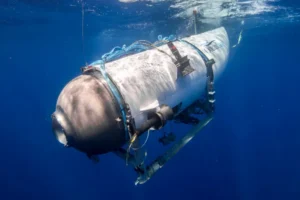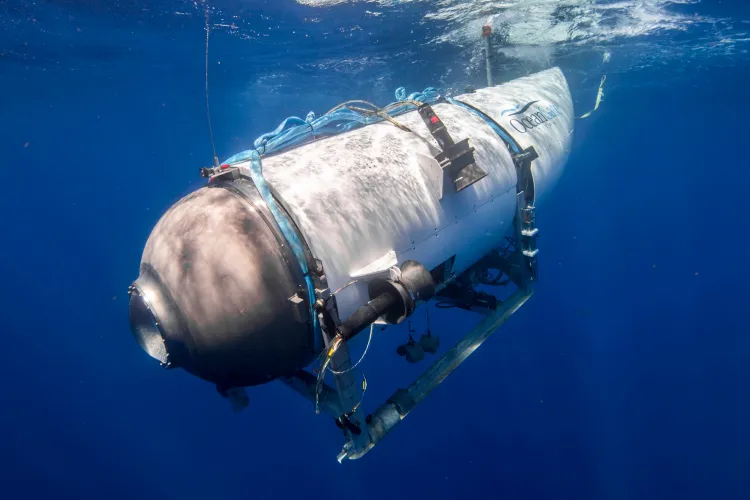Titan Submersible Implosion: Inside the OceanGate Disaster & Coast Guard Report
Titan Submersible Implosion: A Preventable Tragedy Beneath the Sea
Introduction
The ocean is as mysterious as it is unforgiving. On June 18, 2023, tragedy struck 12,500 feet beneath the North Atlantic Ocean when the Titan submersible, operated by OceanGate Expeditions, catastrophically imploded during a dive to the Titanic wreck site. Five lives were lost in an incident that shook the world and prompted widespread scrutiny over safety in private deep-sea expeditions.

Now, in a landmark update in August 2025, the U.S. Coast Guard Marine Board of Investigation (MBI) released its final report, calling the tragedy a fully preventable disaster caused by critical design flaws, ignored warnings, and a toxic company culture.
This SEO-friendly news article provides the most up-to-date insights on the Titan implosion, focusing on the investigation findings, industry reactions, and what this means for the future of deep-sea exploration.
Breaking News: Final Coast Guard Report Reveals Fatal Oversight
On August 5, 2025, the U.S. Coast Guard published a 335-page investigation report, concluding that the 2023 Titan submersible implosion was entirely preventable. The report attributed the incident to:
- Design failures, especially in Titan’s hybrid carbon-fiber/titanium hull
- Lack of third-party certification
- Suppression of safety concerns from engineers and staff
The investigation found that if OceanGate CEO Stockton Rush had survived, he would likely have faced criminal charges for negligence.
“This was not an unpredictable tragedy. It was the inevitable result of prioritizing innovation over safety.” — U.S. Coast Guard MBI Report
Read the full report on the U.S. Coast Guard site.
Key Findings of the Report
According to reports by Reuters and Wired, the final report highlights:
- Titan’s unconventional design as a primary factor in the implosion
- Failure to investigate 2022 sensor anomalies and acoustic warnings
- Unsafe storage of Titan outdoors in cold weather, weakening its carbon-fiber hull
- No third-party safety checks or certifications
- Workplace bullying, with employees discouraged from reporting flaws
Human Cost: Remembering the Victims
The implosion instantly killed all five passengers aboard:
- Stockton Rush – OceanGate CEO and pilot
- Paul-Henri Nargeolet – Titanic expert
- Hamish Harding – British explorer
- Shahzada and Suleman Dawood – Father-son duo from Pakistan
Their deaths remain a sobering reminder of the risks tied to unregulated expeditions. Families continue to seek justice, with the Nargeolet family filing a $50 million lawsuit against OceanGate.
See more via People Magazine.
Legal and Industry Fallout
As of August 2025, OceanGate has ceased operations and continues to cooperate with legal investigations. The Titan case has already triggered:
- Sweeping calls for regulation of deep-sea tourism
- Implementation of 17 safety recommendations by the U.S. Coast Guard
- Debate over international treaties for submersible operations
Learn more about the USCG safety recommendations.
Global Reaction and Media Coverage
The story has inspired global discussion and was the focus of a 2025 Netflix documentary, Titan: The OceanGate Disaster, which premiered at the Tribeca Film Festival. The film explores the technical failures, personal stories, and aftermath of the tragedy.
Coverage from Business Insider revealed how OceanGate’s leadership created a toxic environment, penalizing whistleblowers and downplaying warnings.
What This Means for the Future
The Titan disaster is expected to reshape the landscape of private exploration:
- Mandatory safety certification may become law
- Carbon-fiber pressure hulls are under renewed scientific scrutiny
- Commercial sub operators will face tighter licensing and insurance regulations
Public sentiment has shifted toward caution and regulation, recognizing that innovation should never come at the cost of human life.
Final Thoughts
The Titan submersible implosion is no longer just a tragic memory—it’s a watershed moment in the history of deep-sea exploration. With formal investigations complete and industry-wide reform underway, the hope is that this painful lesson will ensure safer frontiers for future adventurers.
Let this disaster serve as a warning: exploration must always be grounded in responsibility, science, and respect for life.







